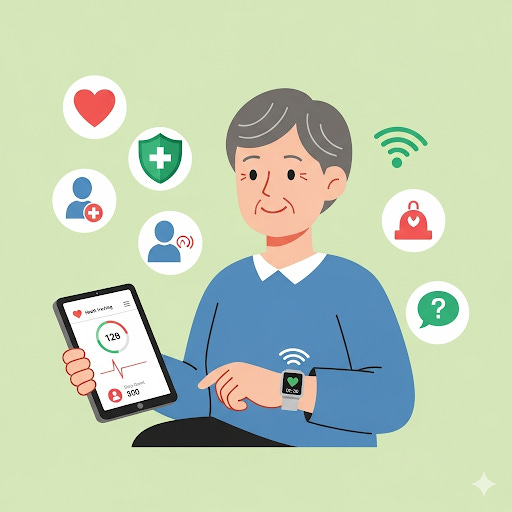Taking Charge of Your Health
Tech That Keeps You Well and Safe
Welcome back to The Senior's Guide to Mastering Tech Without Fear! If you enjoyed learning about staying connected through video calls and messaging, you're ready for our next adventure: health technology. Today's health tech isn't just for doctors and hospitals—it's designed to help you take charge of your wellness right from home.
Why Health Tech Matters for Seniors
Health technology has transformed from complicated medical equipment to simple, user-friendly tools that fit in your pocket or on your wrist. These devices don't replace your doctor—they make your healthcare team stronger by giving you and your medical providers better information about your daily health.
For seniors, health tech offers:
Peace of mind—knowing help is available 24/7, even when you're alone
Early detection—catching health issues before they become serious problems
Independence—staying in your own home longer with smart monitoring systems
Better communication with doctors—sharing real health data instead of guessing
Real-Life Success Stories
Margaret from Phoenix: At 78, Margaret uses her Apple Watch to track her heart rhythm. When it detected an irregular heartbeat during her morning walk, she was able to get medical attention immediately—preventing what could have been a serious cardiac event.
Robert in Rural Montana: Living 45 minutes from the nearest doctor, Robert now has monthly telehealth checkups for his diabetes management. His glucose monitor sends readings directly to his healthcare team, and he hasn't needed an emergency hospital visit in over a year.
The Johnson Family: When 82-year-old Dorothy fell in her kitchen, her medical alert pendant automatically called for help. Emergency responders arrived within minutes, and her family was notified immediately. Dorothy recovered fully and still lives independently.
Getting Started: Your Health Tech Toolkit
Essential Health Tech for Beginners
Wearable Devices
Modern smartwatches and fitness trackers do much more than count steps :
Heart rate monitoring—tracks your pulse throughout the day
Fall detection—automatically calls for help if you take a tumble
Medication reminders—gentle alerts so you never miss a dose
Sleep tracking—helps you understand your rest patterns
Popular Options for Seniors:
Apple Watch—comprehensive health tracking with easy-to-read displays
Medical Guardian smartwatch—designed specifically for seniors with large buttons and emergency features
Fitbit—simple activity tracking with long battery life
Telehealth Platforms
Video visits with your doctor are now as common as phone calls :
Schedule appointments from your computer or tablet
Share health data directly from your devices
Get prescriptions sent to your pharmacy without leaving home
Follow up on treatment without transportation hassles
Home Monitoring Devices
These tools help you track important health metrics daily :
Blood pressure cuffs that automatically record and share readings
Glucose monitors for diabetes management
Smart pill dispensers that track medication adherence
Emergency alert systems for immediate help when needed
Overcoming Common Health Tech Concerns
"It's too complicated for me."
Today's health tech is designed with seniors in mind. Most devices have large, clear displays and simple button layouts. Many include voice commands—just say "call for help" and the device does the rest.
"What if it gives false alarms?"
Modern devices are much more accurate than earlier versions. They learn your normal patterns over time, reducing false alerts. Even if there's an occasional false alarm, isn't it better to be safe than sorry?
"I don't want to bother my family with alerts."
Most systems let you customize who gets notified and when. You can set it so minor alerts go to you first, while emergencies go directly to family and medical services.
"Will my insurance cover it?"
Many health tech devices and telehealth visits are now covered by Medicare and other insurance plans. Check with your provider—you might be surprised by what's covered.
Simple Steps to Get Started
Talk to Your Doctor
Ask about health tech options that make sense for your specific conditions. Many doctors now recommend certain devices or apps.Start with One Device
Don't overwhelm yourself. Pick one tool—maybe a simple fitness tracker or blood pressure monitor—and get comfortable with it first.Set Up Support
Ask a tech-savvy family member or friend to help with initial setup. Most devices also have customer support designed specifically for seniors.Try Telehealth
Schedule a virtual visit with your doctor. It's often easier than you think and can save hours of travel and waiting room time.Practice Daily
Use your device regularly, even when you feel fine. This helps you get comfortable with the technology and establishes your normal baseline readings.
The Future is Bright
Health technology continues to become more senior-friendly every year. By 2025, experts predict that advanced health monitoring will be as common as taking your temperature. The key is starting now, while you're healthy, so the technology becomes second nature.
Remember: you're not just learning to use a gadget—you're taking an active role in your health and independence. Every step you take with health tech is a step toward staying in control of your wellbeing.
What's Next?
In our next post, we'll explore entertainment technology: streaming services, e-books, games, and all the ways technology can add fun and learning to your daily routine.
Have questions about health tech, or want to share your own success story? Drop us a comment or email. Every question helps other readers, and every success story inspires someone else to take that first step.
Remember:
Your health is worth the effort it takes to learn something new. With each device you master, you're building a stronger safety net and a more independent future. The technology is ready—and so are you.


